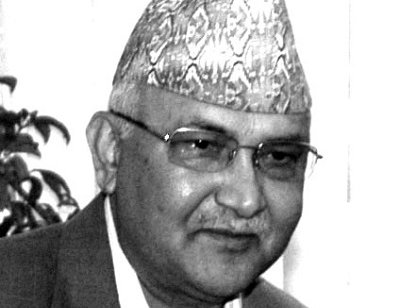
As the deadline for the promulgation of new constitution approaches, two major political events will have major political implications.
After going through a long period of internal disputes, a group within CPN-Maoist led by Netra Bikram Chand finally split and formed a new party named CPN-Maoist. Although CPN-Maoist has a long history of splitting and there are over dozens of group that have emerged from the main stream, Chand, a militant Maoist, made decision to form the separate revolutionary party which is likely to affect the strength of two Maoists challenging the Peace Process as well.
Although UCPN-Maoist leaders and CPN-Maoist leaders are saying that Chand’s new block is unlikely to affect them and it is just a part of reactionary zeal to weaken the revolutionaries, both the parties are cautious to prevent mass defection to Chand’ revolutionary appeal.
After forming his party, Chand challenged the ongoing peace process and Comprehensive Peace Agreement. “The legitimacy of peace process has come to an end. We will oppose the process which betrayed our revolutionary comrades.”
As they feel the threat, UCPN-Maoist and CPN-Maoist have already proposed for unification. “At a time when counter revolutionaries and reactionaries are trying to weaken our revolutionary movement, there is the need of unity among us to protect the achievements of the People’s War,” said Ram Bahadur Thapa Badal, general secretary of CPN-Maoist.
UCPN-Maoist leaders too share the views. “The conspiracy is going on against the entire front to demolish the achievements of the People’s War. Nepali Congress and CPN-UML are trying to revive the old constitution through a majority vote and others are weakening the basis of revolutionary idea of Maoists. There is the need to have a broader alliance of all revolutionaries and agents of change to thwart the design,’ said Krishan Bahadur Mahara, General Secretary of CPN-Maoist.
National Consensus Government
As the possibility of making consensus on constitutional issue is unlikely any time soon, major political parties have switched their strategy to forming a broad-based national government.
CPN-UML has already proposed the formation of a new government with inclusion of Madheshi parties. Nepali Congress is also reportedly in the back-door negotiations with UCPN-Maoist on the formation of the government.
Nepali Congress leaders are suspicious about the move of CPN-UML to negotiate with the Madheshi Front. However, CPN-UML leaders are arguing that this move is to prevent political clashes.
According to CPN-UML leaders, this will prevent the major political showdown between UCPN-Maoist led 22 political parties alliance, which is opposing the political move of Nepali Congress and CPN-UML to promulgate the new constitution through majority voting.
CPN-UML chairman K.P. Sharma Oli has proposed for the Madhes-based parties to join the current government to create a favorable environment for producing a new constitution in time. “We are not for joining the government prior to promulgation of a new constitution," said Rajendra Mahato, chairperson of Sadbhavana Party.
“The proposal jointly registered by Nepali Congress (NC) and CPN-UML at the committee of the Constituent Assembly (CA) was the major reason behind the prolonged deadlock in the constitution writing.”
Given the current political stand of UCPN-Maoist alliance, any move in the direction of constitution writing is unlikely. “If the ruling parties use force, we will be compelled to retaliate. We will not allow killing the changes,” said UCPN-Maoist leader Prachanda. “If necessary, we will launch the street agitation as well.”
Encouraged by Indian Prime Minister Narendra Modi’s suggestion to bring the constitution through consensus, the UCPN-Maoist led 22 allies are taking a harder stand.
As the political disputes continue, the meeting of the Constitutional Political Dialogue and Consensus Committee (CPDCC) has been postponed indefinitely. UCPN-Maoist leader Dr. Baburam Bhattarai has already made it clear that he cannot summon the meeting until there is a political consensus.
Progress in Constitution Making
Despite the claim of leaders of major political parties, there are more issues needing settlement in the new constitution. “How can they promulgate the constitution when only less than 10 percent issues have been settled? We are yet to settle 90 percent issues," said Madheshi Janadhikar Forum leader Upendra Yadav. “No substantial decisions have been made. I don’t think the new constitution will be promulgated even in the next year given the present pace of constitution writing.”
As the deadlock continues, the parties are now preparing the way to amend the calendar of Constituent Assembly. “You cannot make consensus on constitutional issues just by following the calendar. We need our mental calendar rather than this,” said Yadav.
Possible Scenario
Negotiating with the opposition parties, Nepali Congress and CPN-UML have already shown that they intensify the discussions on power sharing. As the new constitution will not be promulgated by January 22, CPN-UML is likely to stake a claim to the government.
The power struggle will push the constitution writing process further behind. The coming power struggle will have major effects on the overall development of the country. Unstable government will invite disorder and disorder is likely to have implications on implementation of programs.
Given the present scenario with uncomfortable relations between Nepali Congress and CPN-UML, UCPN-Maoist led alliance may emerge as a power broker. The recent decision to revive Madheshi Morcha with 45 seats is an indication of the nature of the ensuing power game. There will be more power struggles in the coming days than discussions on constitution writing.
- NEPAL-THAILAND: Joint Business Council
- Apr 13, 2025
- BIMSTEC SUMMIT: Nepal’s Stand
- Apr 11, 2025
- IME GROUP: Expands Into Paper Industry
- Mar 24, 2025
- CPN UML: Instigated By India
- Mar 23, 2025
- ADB’S CHIEF ECONOMIST: Nepal Reduces Poverty
- Mar 11, 2025















